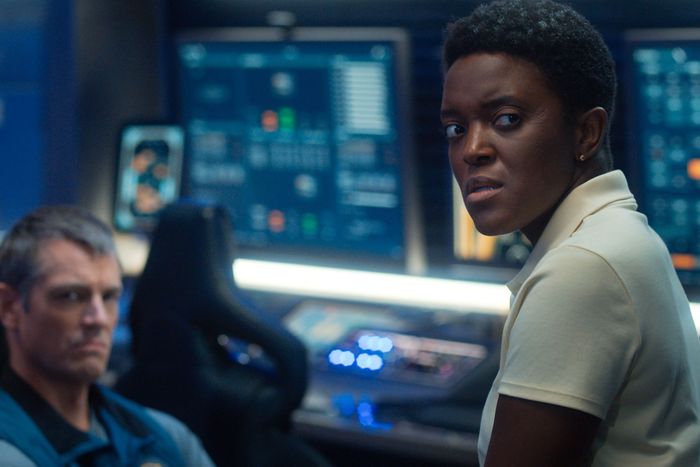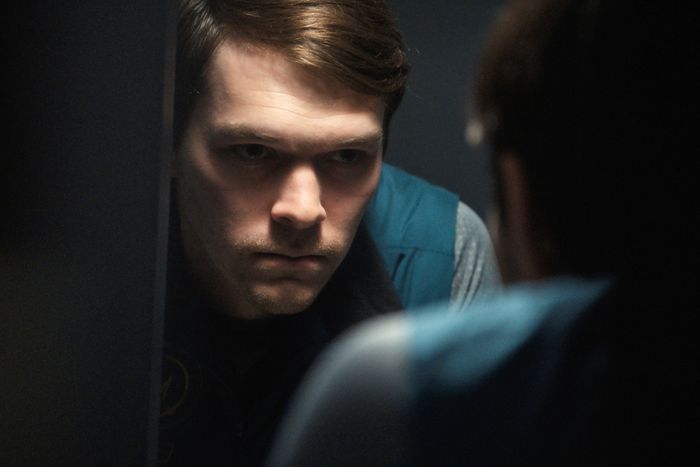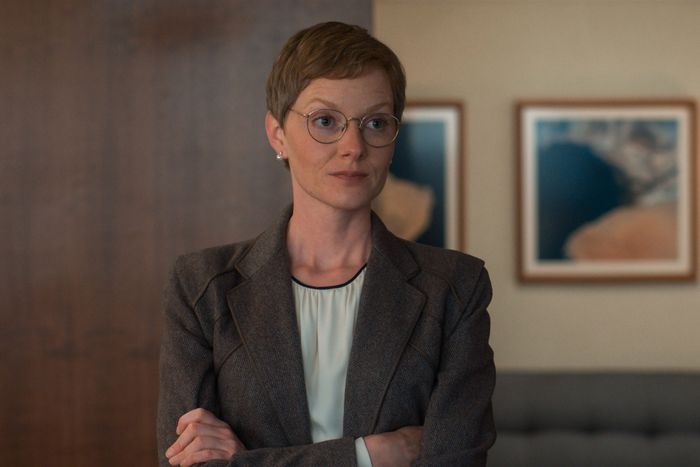
This article was published after the For All Mankind season-three finale in August. We still have a while to wait until season four, but you don’t need a spaceship to see cast members Krys Marshall and Lev Gorn at Vulture Festival in Los Angeles on November 13. Tickets are on sale now!
For All Mankind has conditioned us to want more. With each of its three seasons, the Apple TV+ space drama has upped its own stakes and deepened the relationships between its many characters and the dueling American and Soviet governments. In this latest season — which started off with a wild space-hotel rescue sequence that might have been the finale of a less-confident show — NASA astronauts, Soviet cosmonauts, and privately funded Helios explorers made it to Mars, but the journey there was fraught and their time on the planet unexpectedly dangerous. On Earth, animosity between Democrats and Republicans deepened, the KGB leaned harder on its Soviet and American assets, and conspiracy theorists resentful of NASA’s fusion-energy technology and how it upended the oil-and-gas industry plotted their revenge. The aging makeup has been a little ridiculous, but the storytelling has been great!
Season finale “Stranger in a Strange Land” literally blew up some of these subplots with a devastating attack on the Johnson Space Center, a rearranging of various characters and their loyalties, and a now-customary time jump eight years forward. Where else can For All Mankind — renewed in July for a fourth season — go from here, narratively and physically? TV critics Kathryn VanArendonk and Roxana Hadadi have some ideas, suggestions, and demands.
Kathryn: Retire nearly everyone from the original cast.
It’s time. It’s past time, frankly — it’s been three lovely seasons with many of these characters, but we’ve long since passed the point where the seeds planted in seasons one and two have borne fruit. There’s a real pleasure in watching family dynamics spin out across many years and many events, but the downside is that a show can get trapped circling the same familiar tensions. Characters like Ellen, Ed, and Margo have had long runs; it’s time to thank them for their service and wave a fond farewell.
Kathryn: If you must keep characters around, it’s time to recast them.
For All Mankind can make a colony on Mars that looks so convincing you’d swear it’s shot on location, but it cannot make Joel Kinnaman look like he’s more than 60 years old, and it definitely can’t do the same for 35-year-old Jodi Balfour. There’s nothing wrong with a strategic recast, especially if it’s in order to retain some of the younger characters like Kelly, Aleida, or [shudder] Danny. It’d be better to cast an older actor in the role than to try to convince us that Cynthy Wu is 40.
It’s going to be painful to say good-bye to everyone, particularly characters who have lots of remaining narrative energy. But For All Mankind already has a well-established way to deal with this, a favorite device of showrunner Ronald D. Moore: the mid-season time jump. Bring back Wrenn Schmidt to put a cap on the Margo story. Let us see a nice moment of President Ellen snuggling with her girlfriend. Give bona fide rock star Danielle Poole the send-off she deserves and weave that together with the start of a new space paradigm. And then, BAM! Cut to the year 2014. Aleida comes back in her late 40s, played by a new actor. Everyone else watches fondly from the comfort of their well-earned retirements.
Roxana: Counterpoint — KINNAMAN STAYS!
“It cannot make Joel Kinnaman look like he’s over 60 years old” — Why is Kathryn attacking me like this? I would personally like to say that any form of Kinnaman is acceptable in this series. Floating head suspended in some kind of space goop? Sure. MP3 audio files left behind for Kelly or his grandchild to listen to? Also sure. Kinnaman’s jawline and forearms are very important parts of the For All Mankind viewing experience, and we must honor them by never letting this man leave!
Roxana: Counter-counterpoint — but Danny does not!
We do not need to keep Danny, in original or aged-up form. He can go. Take your self-pitying Karen Baldwin obsession, your mopey sad-sack affect, and your murdering of poor Nick Corrado and get out of here, buddy! Stay in Mars exile forever, where you belong!
Kathryn: In a post-9/11 version of For All Mankind, NASA becomes militarized.
The series toyed with militarization pressures fairly often during seasons one and two, with Margo constantly pushing back against the incursion of military interests. It made sense that during season three, with more collaboration with Russia and at least some of the space-race pressure displaced onto private companies, that military heft was not quite as present. But if FAM does include the early 2000s’ overwhelming focus on terrorism (which seems probable, given how close the show likes to stick to our own timeline), the logical course of action is for NASA to fully cave to military interests. It has been impressive to watch as FAM has built NASA into a huge, glossy enterprise and then slowly begun to dismantle it — a militarized NASA feels like a way to extend both of those impulses.
Roxana: If FAM does lean into militarization, it needs to improve the conspiracy-theory angles.
9/11 and the ensuing forever wars in Iraq and Afghanistan feel like impossible things for FAM to ignore, so let’s go ahead and assume that some version of these events occurs in the season-four timeline. If so, FAM will probably need to continue incorporating the conspiracy-theorist angle that consumed lonely, impressionable, infuriating Jimmy Stevens in season three, given the rise of 9/11 truthers in the decades since that attack. But this time around, can FAM do it better? It was infuriating how quickly Jimmy caved to these people, and if there was meta-commentary there on how individuals latch onto these ideologies in order to feel less alone, it was undercut by how punchable and thinly sketched the characters were. Charles and Sunny appeared out of nowhere to have a tremendously outsize effect on the storyline, and maybe that would have been palatable if these subplots didn’t leave little trails of inexplicable details. (No one noticed the statues of Gordo and Tracy were gone, and Amber didn’t call the JSC to come and get them from her front yard?) The normalization of “fake news” followers makes sense to include in FAM’s version of reality, but if they could be less annoying — and if they could have less screen time as FAM explores other countries that certainly would be more involved in the space race by now, like the Koreans of the season-three finale — that might be more tolerable. And can Jimmy please make some other friends?
Kathryn: Do privatized space exploration again, but better this time.
Season three’s decision to add an egomaniacal tech dude to the space-race mix made so much sense! Of course some Elon Musk/Jeff Bezos/Steve Jobs type would have gotten rid of all the cubicles in his office and also sent a literal hotel to Mars. Of course he would have screwed things up because he was more interested in the PR and in “winning” than he was in how to make any of this actually function. But unfortunately, Dev Ayesa never really worked as a character. He ping-ponged back and forth between sensible, decent intentions and outright villainy. Much of the later-season plot seemed stuck on the company’s financials, and yet those details (or how any of this would translate into corporate profits) were never clear. Plus those all-hands meetings … yikes. Private space exploration should still be a significant part of the show going forward, but it needs a more pointed, thoughtful handling in the future. The egomaniacal CEO figure should be more specific rather than a mishmash of several CEO types. The role of consumer-facing capitalism should be larger; concerns about privacy and digital overreach should be messier.
Roxana: But keep the lady who yells at Dev!
Kathryn is right that not much about the Helios storyline clicked — Dev was never more than an Elon Musk/Jeff Bezos/Steve Jobs stand-in, and he didn’t really display any motivations beyond “unchecked ambition.” But there is one aspect of this storyline that I cannot stop laughing about: the curly-haired Helios employee who IMDb informs me is named Heather and is portrayed by actress Cheyenne Perez. For most of the season, Heather exists primarily as a foil for Karen Baldwin, whose connections to NASA and business-minded nature pit her against Dev. But then, in the finale, when Heather learns that Helios employees will make less if they leave the company to follow Dev somewhere new, she suddenly becomes a class warrior who sneers at Dev’s elitism. Her line reading of “That’s pretty easy for you to say, Dev. You’re, like, rich” is so unexpectedly petulant and (perhaps unintentionally?) amusing, and I would like to keep her around so she can recurrently serve in a useful Debbie Downer capacity.
Roxana: If we’re going with a new cast, amp up The Americans crossover.
For All Mankind is a good show about people who, despite being caught in the middle of geopolitical tension between the United States and the Soviet Union, stick to their missions and their responsibilities as best as they can, while sometimes realizing collaboration is essential for the greater good and other times admitting that compromise is the first step toward erasure. It’s all very morally murky and compelling, and you know what was another good show about those exact same things? The Americans! Over its three seasons, For All Mankind has incorporated an array of veterans of that FX show, with Wrenn Schmidt on the side of the Americans (for now, wink-wink) and Vera Cherny, Lev Gorn, and Alexander Sokovikov as representatives of the Roscosmos Soviet space program. We know season four will include a time jump to 2003 and Margo in Moscow, so why not use this as an opportunity to expand the Soviet cast even more? Get Costa Ronin in here; The Endgame was canceled, and he would make a great, tall cosmonaut! Or Annet Mahendru, perhaps, as Margo’s handler in a fun switch of their roles on The Americans? And maybe one day Margo is walking to a grocery store and she bumps into Alison Wright’s Martha! A shared universe — isn’t that what For All Mankind is all about?!
Roxana: Keep putting that music budget to good use.
Musicians Jeff Russo and Paul Doucette have done a wonderful job creating original, soaring music for FAM that matches both the grand scale of otherworldly exploration and the tension of earthbound politics. Give them a raise! But, also, can season four continue FAM’s excellent streak of ’90s rock and alternative needle drops? Radiohead, Mazzy Star, Elastica, the Toadies, Soundgarden, and the Smashing Pumpkins have all been featured in season three, and they’ve lyrically and sonically matched this season’s themes. (Sometimes it’s just pretty cool to be vibing out to the universe alongside Chris Cornell, RIP.) Theoretically, the time jump into the 2000s means that FAM should be advancing into the music of the aughts, but for the sake of us Gen-Xers and geriatric millennials, the ’90s feel preferable. Maybe some Nine Inch Nails? The Cranberries? Hole? Garbage? Or even — be still, my heart — Rage Against the Machine? I have a whole karaoke list I can share if FAM needs suggestions!
Kathryn: What comes after Mars? Is it aliens?!
No seriously, is it aliens though? It should not be aliens; the idea of humanity spinning out endlessly into a futile, lonely space exploration is far more alarming and distinctive. But if it is aliens, they should be like Contact aliens rather than Men in Black aliens, weird metaphysical entities that screw around with human minds and remain total, nonthreatening, mind-altering mysteries.





